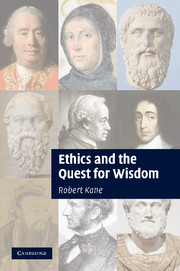Book contents
- Frontmatter
- Contents
- Acknowledgements
- 1 Introduction: pluralism and uncertainty
- 2 Openness
- 3 The retreat
- 4 The moral sphere
- 5 Fact and value
- 6 Value experiments
- 7 Virtues, excellences and forms of life
- 8 The fourth dimension
- 9 Aspiration
- 10 Wisdom
- 11 Objective worth
- 12 The Bach crystals
- 13 Human flourishing
- 14 The Faust legend and the mosaic
- 15 The good and the right (I): intuitionism, Kantianism
- 16 The good and the right (II): utilitarianism, consequentialism
- 17 The good and the right (III): contractualism
- 18 Politics, public morality and law: justice, care and virtue
- References
- Index
2 - Openness
Published online by Cambridge University Press: 07 September 2010
- Frontmatter
- Contents
- Acknowledgements
- 1 Introduction: pluralism and uncertainty
- 2 Openness
- 3 The retreat
- 4 The moral sphere
- 5 Fact and value
- 6 Value experiments
- 7 Virtues, excellences and forms of life
- 8 The fourth dimension
- 9 Aspiration
- 10 Wisdom
- 11 Objective worth
- 12 The Bach crystals
- 13 Human flourishing
- 14 The Faust legend and the mosaic
- 15 The good and the right (I): intuitionism, Kantianism
- 16 The good and the right (II): utilitarianism, consequentialism
- 17 The good and the right (III): contractualism
- 18 Politics, public morality and law: justice, care and virtue
- References
- Index
Summary
OPENNESS AND RELATIVISM
This chapter presents an initial response to the problem of pluralism and uncertainty posed at the end of Chapter 1. The argument of this chapter is preliminary and incomplete, but it will serve as a template that will be progressively refined in subsequent chapters in response to questions and objections.
One natural reaction to the pluralism and uncertainty discussed in the previous chapter that is common in modern pluralist and democratic societies is the following. People think to themselves that since it seems impossible to demonstrate that their view is right from their point of view (because of the circularity problem mentioned) and since everyone else is in the same condition, the only proper stance to take in the presence of pluralism and uncertainty is an attitude of “openness” or tolerance toward other points of view. Judgments about good and evil, right and wrong, one might reason, are personal matters that should be made for oneself and not imposed on others against their will. Is it not true that much of the evil of human history has come from taking the opposite attitude, assuming one has the correct view and the right to impose it on others? “Evil takes root,” as the late Russian poet Joseph Brodsky once said, “when one man begins to think he is superior to another.
- Type
- Chapter
- Information
- Ethics and the Quest for Wisdom , pp. 14 - 26Publisher: Cambridge University PressPrint publication year: 2010



